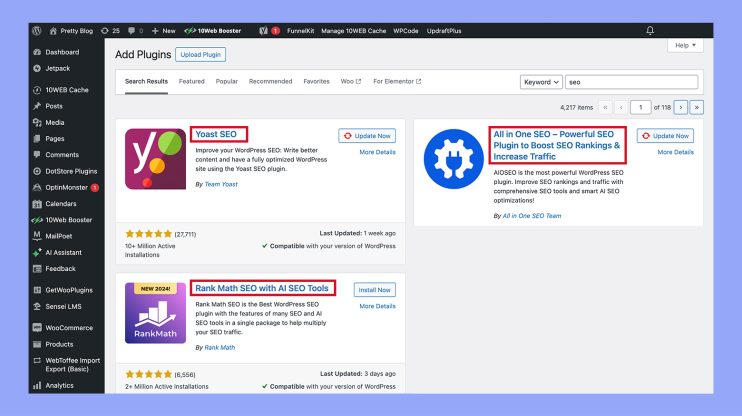What is a Keyphrase in WordPress
When you’re working with WordPress to create content for your website, understanding what is a keyphrase is essential to improve your Search Engine Optimization (SEO) efforts. A keyphrase, often central to the content on your page, is a specific set of words that you expect potential visitors to search for to find your post or page. So, choosing the right keyphrase can greatly increase the visibility of your content on search engines like Google.
WordPress, being one of the most popular content management systems in the world, offers a range of SEO tools to help you optimize your content. You’ll typically enter your desired keyphrase into a focus keyphrase field provided by an SEO plugin. This acts as a target for your content optimization. The plugin then evaluates your content against your keyphrase to provide suggestions for improvement, ensuring that the keyphrase is effectively incorporated throughout your work.
With the right approach to keyphrases, you can enhance user experience and give your pages the best chance of being noticed by those who are looking for the information you provide.
Understanding keyphrases in WordPress
In your journey to enhance your WordPress site’s visibility and user experience, the strategic use of keyphrases plays a pivotal role.
The importance of keyphrases
Keyphrases are essential for SEO as they connect your content to your target audience. By identifying and using focus keyphrases, you increase your content’s chances to rank higher in search results on platforms like Google. This is not simply about stuffing your content with phrases; it’s about crafting comprehensive content that genuinely addresses the queries and needs of your visitors. A well-chosen keyphrase acts as a compass for both your content strategy and for the search engines that index your site.
Take for instance, if you run a blog about eco-friendly living, a focus keyphrase like “sustainable home tips” can help Google’s algorithms understand that your content is a match for users looking to live more sustainably. Using an SEO plugin for WordPress can greatly simplify the process of optimizing your content around these keyphrases.
Difference between keyphrases and keywords
At first glance, keyphrases and keywords may seem interchangeable, but their differences are significant. A keyword is typically just one word, while a keyphrase consists of two or more words that form a concept or idea. This distinction is important because individual keywords can be too broad and fiercely competitive, whereas keyphrases can be tailored to the specificities of your content and target audience, allowing for more precise SEO strategies. For example, “photography” is a keyword, but “wedding photography tips” is a keyphrase that targets a particular niche.
The use of keyphrases allows you to create more focused and detailed content that can closely align with what users are searching for. As WordPress SEO evolves, adapting your strategy to focus on significant and relevant keyphrases helps your content resonate with your audience and search engines alike.
How to choose the right keyphrase
Choosing the right keyphrase is crucial for optimizing your content for both your audience and search engines. A well-selected keyphrase can enhance your site’s SEO and make your content more relevant and easily discoverable to those who are searching for it.
Keyword research basics
Understanding the fundamentals of keyword research is the first step in selecting a keyphrase that will help your WordPress content thrive. Begin by brainstorming keywords that are relevant to your topic and that your audience might use to find your content. When pinpointing these keywords, consider the questions or problems your readers are seeking to solve. This empathetic approach ensures you’re not only targeting words with high search potential but also creating value for your readers.
Tools like Google Keyword Planner can give you insights into trends and how often certain words are searched. Remember, the goal is to find a balance between relevance and searchability.
Analyzing competition and search volume
After you’ve identified potential keywords, it’s time to weigh them against two critical factors: competition and search volume. Keywords with high search volume indicate a significant interest from users, but they also often come with high competition, making it harder to rank for them. On the other hand, keywords with low competition may be easier to rank for, but they might not attract as much traffic if they have a very low search volume.
You’re looking for that sweet spot — terms popular enough to drive significant traffic but niche enough to remain within reach. This is where SEO analysis tools can help you assess the competitive landscape.
Using tools for keyphrase discovery
Leveraging various tools can simplify the process of finding and evaluating keyphrases. For example, Semrush offers a feature-rich platform that provides keyword suggestions, search engine rankings, and performance history to help you make an informed decision.

Feel free to experiment with different tools and don’t shy away from trying various combinations of keywords to see which ones offer the most promising outlook in terms of competitiveness and search volume. Remember, the keyphrase you choose will guide your SEO efforts, so invest time to get it right.
Best SEO practices for keyphrases
To truly enhance your website’s visibility and user experience, focusing on keyphrase optimization is essential.
Optimizing content with keyphrases
Your content becomes more search-engine friendly when you strategically embed keyphrases that you want to rank for. Use your focus keyphrase in the title, headers, and throughout your article in a natural and meaningful way.
Remember: while frequency is important, overuse can undermine readability and be penalized as keyword stuffing. Ensuring the keyphrase fits naturally into your content is a cardinal rule of SEO copywriting.
Including synonyms and variations
Search engines have become sophisticated enough to recognize synonyms and thematic variations of your keyphrases. Incorporate these into your content to avoid repetitiveness and to capture more search queries. For instance, if your keyphrase is ‘best SEO practices’, variations could include ‘top SEO strategies’ or ‘SEO best methods’.
Understanding user intent
It’s crucial that your content aligns with the search intent of your target audience. There are typically four types of search intent: informational, navigational, transactional, and investigative. Delve into the mindset of your potential visitors: Are they seeking information, looking to make a purchase, or comparing options? Your content should provide answers and solutions that correspond with these intents to improve the overall user experience on your site.
Keyphrase optimization tools
When you’re ready to improve your website’s rankings and traffic, choosing the right tools for keyphrase optimization in WordPress is crucial. They’ll help you streamline the setup process and offer a variety of features to maximize your content’s potential.
Setting up SEO plugins
When you decide to enhance your site with SEO plugins, Yoast SEO, All in One SEO, and Rank Math are among the top choices. Each plugin typically includes a setup wizard to guide you through the initial configuration. For instance, in All in One SEO, the setup process involves activating the plugin and following the steps provided to tailor it to your site’s needs. Likewise, Yoast SEO starts with a configuration wizard that assists in optimizing your site settings, while Rank Math offers a user-friendly setup combined with a detailed configuration checklist.

Features of popular SEO plugins
The market leaders in SEO plugins come packed with features supporting both the free version and pro version. Yoast SEO is renowned for its traffic light system, indicating your SEO score at a glance—a green light signifies good optimization.
All in One SEO boosts your content’s visibility with features like XML sitemaps and SEO for social media. Meanwhile, Rank Math provides advanced schema generation and keyword suggestions to further enhance your page’s relevancy. Many plugins give clear insights into how improving certain elements can directly influence your rankings, helping to drive more traffic to your website.
In conclusion, understanding and effectively using keyphrases in WordPress is fundamental for optimizing your content and enhancing your site’s SEO performance. By strategically incorporating keyphrases into your content and leveraging SEO tools and plugins, you can improve your site’s visibility and attract more relevant traffic. Remember to choose keyphrases that balance relevance and search volume, ensuring they align with the search intent of your audience.




